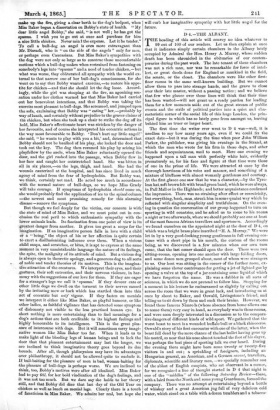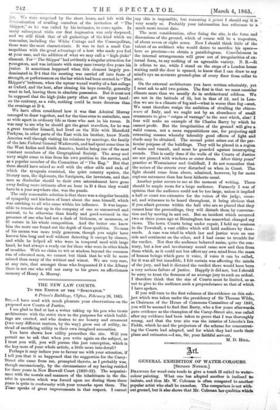D 4.—THE ALBANY.
THE heading of this article will convey no idea whatever to 99 out of 100 of our readers. Let us then explain at once that it indicates simply certain chambers in the Albany lately occupied by Admiral the Hon. Henry A. Murray, whose sudden death has been chronicled in the obituaries of our contem- poraries during the past week. The late tenant of these chambers was not a rich man, nor was he remarkable for force of intel- lect, or great deeds done for England or. mankind in the field, the senate, or the closet. The chambers were like other first- floor rooms in the same well-known building. But we cannot allow them to pass into strange hands, and the grave to close over their late master, without a passing notice ; and we believe that few who glance over these lines will think that their time has been wasted—will not grant us a ready pardon for leading them for a few moments aside out of the great stream of public events and the strife of political parties into a quiet and cha- racteristic corner of the social life of this huge London, the prin- cipal figure in which has so lately gone from amongst us, leaving behind him no truer or larger heart.
The first time the writer ever went to D 4 was—well, it is needless to say how many years ago, even if we could fix the exact date—but it was during the time when poor John William Parker, the publisher, was giving his evenings in the Strand, at which the men who wrote for his firm in those days, and other friends and acquaintances, used to meet. Here one evening we happened upon a tall man with perfectly white hair, evidently prematurely so, for his face and figure at that time were those of one in the prime of life. We were attracted at once by the thorough heartiness of his voice and manner, and something of a mixture of bluffness with almost womanly gentleness and courtesy. At the first glance one saw that he was a character,—by the Tyro- lean hat, soft brown felt with broad green band, which he wore always, In Pall Mall or in the Highlands; and better acquaintance confirmed the impression. There was no straining after effect or eccentricity, but everything, book, man, struck him in some quaint way which he reflected with singular simplicity and truthfulness; On the even- ing in question the conversation of our group happened to turn on sporting in wild countries, and he asked us to come to his rooms a night or two afterwards, where we should probably see one at least of the most famous African travellers and sportsmen. Accordingly we found ourselves on the appointed night at the door of D 4, on which was a bright brass plate inscribed "H. A. Murray." We were let in by a very good-looking young gentleman in full evening cos- tume with a short pipe in his mouth, the custom of the rooms being, as we discovered in a .few minutes when our own turn came, that the last comer should open the door. There were two sitting-rooms, opening into one another with large folding doors, and some dozen men grouped about, most of whom were strangers to us. Our host was sitting in the corner of the further room, ex- plaining some clever contrivance for getting a jet of lighted gas by opening a valve at the top of a jar containing some liquid of which we have forgotten the name. He was a dabbler in all sorts of sciences, in which we do not pretend to follow him. Stopping for a moment in his lecture he embarrassed us slightly by calling out across the room that we were in great luck, and introducing us at once by shout to Baker, and Oswald, Livingstone's friend, and telling us to sit down by them and suck their brains. However, we found these famous Nimrods (whose absence from home allows one to name them) very easy in hand, as everybody was in those rooms, and were soon deeply interested in a discussion as to the compara- tive dangers of different kinds of wild sport. We gathered that the worst beast to meet is a wounded buffalo bull or a black rhinoceros.
Oswald's story of his first encounter with one of the latter, when the beast fell dead by the mere chance of the last bullet having gone up his nostril, so near that his nose almost touched the foot of his slayer,
was perhaps the best piece of sporting talk we ever heard. During the evening there might have been some twenty or twenty-five visitors in and out ; a sprinkling of foreigners, including an Hungarian general, an American, and a German savant, travellers, diplomats, scientific and literary men, —we specially remember one of the ablest of English essayists, who sat observant in a corner, for we recognized a line of thought started in D 4 that night in one of the " middles " of the following Saturday Review—these, with a laird from the North and some young Guardsmen, formed the company. There was no attempt at entertaining beyond a bottle of whiskey and a great American jug full of very delicious cold water, which stood on a table with a dozen tumblers and a tobacco- jar; We were surprised by the short hours, and left with the &termination of availing ourselves of the invitation of "The Skipper," as he was called by his intimates, to come again. In many subsequent visits our first impression was only deepened, and we still think that of all gatherings of the kind which we remember, including the White Cottage and the Cosmopolitan, these were the most characteristic. It was in fact a small Cos- mopolitan with the great advantage of a host who made you feel at your ease, and the addition of what we may call a " bigh-jinks" element. For "The Skipper" had evidently a singular attraction for youngsters, and was intimate with many men twenty-five years his junior. It sometimes happened when this element largely pre- dominated in D 4 that the meeting was carried off into feats of strength, or performances on the bar which had been erected in "The Skipper's" bedroom, when the uproar waxed worthy of a fast college at Oxford, and the host, after abusing his boys roundly, generally went to bed, leaving them in absolute possession. But it must not be supposed that the high-jinks party often got the upper hand: on the contrary, as a rule, nothing could be more decorous than the evenings at D 4.
We have often considered how it was that Admiral Murray managed to draw together, and for the time even to assimilate, men so wide apart in ordinary life as those who met in his rooms. It was easy to see why he should get the great travellers, for he was a great traveller himself, had lived on the Nile with Mansfield Parkyns, in other parts of the East with his brother, knew North America well through visiting his relations by marriage, the family of the late Federal General Wadsworth, and had spent some time in the West Indies and South America, besides being one of the most constant members of the Geographical Society. The army and navy might come to him from his own position in the service, and as a popular member of the Committee of "The Rag." But that these should have mixed so well with the other odds and ends of which the symposia consisted, the quiet country squires, the literary men, the diplomats, the foreigners, the inventors, and that men so dissimilar should to their own astonishment have gone away feeling more intimate after an hour in 1) 4 than they would have in a year anywhere else, was the puzzle.
The only reasonable solution is that there was a singular breadth of sympathy and kindness of heart about the man himself, which was catching to all who came within his influence. It was impos- sible to remain shut up in the company of one so unreserved and natural, to be otherwise than kindly and good-natured in the presence of one who had not a dash of littleness, or meanness, or ill nature in his whole composition. And the better one knew him the more one found out the depth of these qualities. No man of his means was more truly generous, though you might have known him long and well without detecting it except by chance, and while he helped all who were in temporal need with large hand, he had always a ready ear for those who were in other kinds of troubles. With no claim to wit or wisdom beyond the common run of educated men, we cannot but think that he will be more missed than many of the wittiest and wisest. We are very sure, at any rate, that amongst those who frequented D 4 the Albany there is not one who will not carry to his grave an affectionate memory of Henry A. Murray.































 Previous page
Previous page